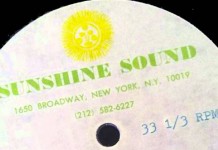
For the public at large, it’s all about KC. For people who really love music, it’s Gino Soccio, it’s T-Connection, it’s Boris Midney and Queen Samantha and more.
Behind these artists was TK Disco, and TK Disco was one of more than a dozen record imprints belonging to Henry Stone.
TK Disco wasn’t just a successful indie label. It was Sub Pop, if Sub Pop had signed the Sex Pistols, Joy Division and Nirvana, and did so all at the same time. It was a breathtaking collection of talent, artists that wrote and produced some of the best records of their careers for Henry — which by extension means some of the best records ever made.
Stone’s life – the good and the bad and the brilliant and the shadowy – are the subject of a new documentary – and possibly the best disco documentary – The Record Man. Directed by Mark Moorman and produced by Mitchell and Debra Egber, The Record Man is currently ambling about the United States on the festival circuit and creating buzz (much like what you’re reading) in a way that would do its subject proud.
The Record Man originally had the working title Rock Me Baby, after the smash hit by George McCrae that’s often considered the “first disco record.” It was under this name that DEL mentioned the film in his Foundations column on TK Disco last Summer. This is a lot of press from two people at the same media company that, to the best of my knowledge, have never been pitched this story at all. But the story of Henry Stone and the music of TK Disco is just that good – it draws you in, works you over for awhile and spits you out a bit ragged for wear but better for the experience.
Stone’s history in the music business goes back far beyond Disco. You could find him in the immediate post World War II years in Los Angeles, where he sold records from the boot of his car. In Miami he would form a record distributor that almost could have been called a cartel, with all of the associations that word implies. Like many music men (great and small – read my story about Bud Pressner’s audio empire in Gary, Indiana for another example), Stone dreamed of a kind of vertical integration that would dominate the industry, or at least protect his part of it from the larger players in New York and LA. He would record, distribute, promote and own everything of some things, and some things of everything else.
Stone had been recording music since the 1950s; by the 1970s he moved into a new studio built by Terry Kane, whose initials would become the proud monogram of Stone’s company. For while TK Disco represents the apex of Stone’s musical empire – it’s certainly the most influential and inspiring today – Stone cast his nets wide. Part of it was simply to keep ahead of trends. Part of it was, as DEL noted, to “ensure that clubs and especially radio stations played all of their music.” (A mention here has to be made to Ray Caviano, the primary focus of DEL’s piece on TK Disco, whose skill and taste has a lot to do with why we’re still talking about TK Disco thirty years later.)
TK Disco collapsed with the rest of the nascent “Disco industry,” which historians have decided to mark in the racist and homophobic explosion at Comiskey Park called Disco Demolition Night. For most Disco performers, this was a death sentence – they were so strongly identified with the reviled genre that the ’80s hate jag against Disco just destroyed their careers. Those who could slip behind the scenes usually did, either as hired guns behind recording consoles or record executives pushing the synthetic, sometimes sterile “Antidisco” of the next wave. Henry dug through his bag of tricks and fished out one last trick – Miami Freestyle, probably his last contribution to the lexicon of 20th century music, of which he was one of our greatest hidden authors.
DEL notes that Henry Stone was still with us at the time of writing; sadly, he passed away just a few months later, in August 2014.
But The Record Man isn’t quite the final word. I’ve been an avid reader of henrystonemusic.com, one of the most peculiar music sites on the internet, for some time now. There’s a low-key genius to it, really, with Henry droppings bombs about being the secret financier of Sugar Hill Records and hawking ebooks called The Stone Cold Truth On Payola! which, despite its title, also promises to reveal “who was on drugs, where they did them, and how much they cost.”
And little bits like this, about Famous Amos (of Famous Amos Cookies) and his days as an agent for TK artist Steve Alaimo:
When Steve Alaimo was in college he had a band called the Redcoats. Around that time, he started hangin’ around with me as a promotion man, sort of a hangaround guy, and I’d take him up to Ernie Busker’s place, the Palms Of Hallandale to see BB King and James Brown…
Later I got him on as the opener for James Brown for a stadium show in Miami, and after the gig James said to me “Don’t ever let that whiteboy on before me again.” That’s how good Steve was.
The Record Man on the Cookie Man and James Brown vs. The Whiteboy. God bless you, Henry.
The Record Man is currently being shown at film festivals around the US. DEL’s Essential TK Disco Playlist has quite a few more selections from the label, both deep catalog and the hits.






















[…] Henry Stone’s estate gave Danny Krivit the keys to the TK Disco vault, a razor blade and as much time as he […]